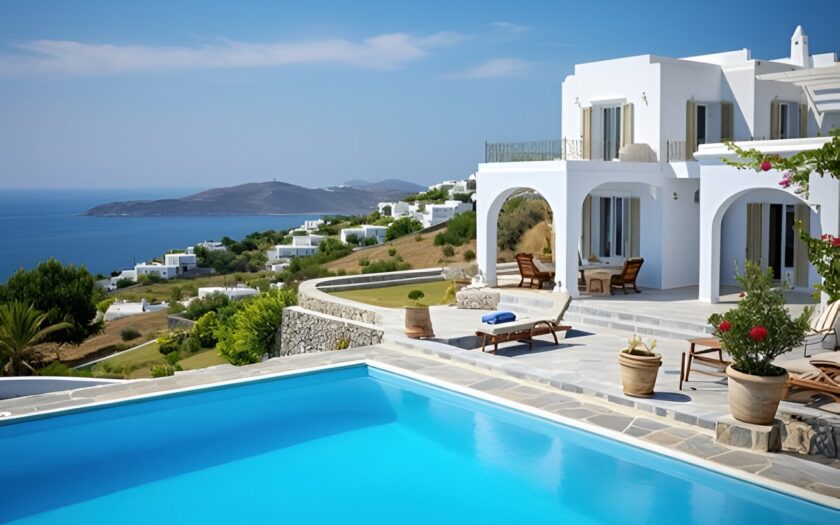Malta has emerged as one of the Mediterranean’s most sought-after destinations for property investment, combining historical charm with modern amenities. The island nation’s compact size doesn’t diminish its appeal—instead, it offers an intimate living experience with world-class facilities. For those seeking a luxurious Mediterranean lifestyle, villas for sale in Malta represent an exceptional opportunity to own a piece of paradise.
Key Takeaways
- Malta offers EU residency benefits and favorable tax incentives for property buyers
- Villa prices range from €500,000 to several million depending on location and features
- Foreign buyers require an AIP permit, which typically takes 4-6 weeks to obtain
- Popular villa locations include Sliema, St. Julian’s, Mellieha, and Gozo
- Rental yields average 4-6% annually in prime locations
Why Malta Is a Prime Location for Villa Investment
Malta’s strategic position in the Mediterranean makes it an ideal destination for those seeking both a primary residence and a vacation retreat. The archipelago consists of three main islands—Malta, Gozo, and Comino—each offering unique characteristics that appeal to different buyer preferences. The country’s stable political environment, strong economy, and English-speaking population create an attractive ecosystem for international investors.
The Maltese government actively encourages foreign investment through various initiatives and residency programs. This welcoming attitude towards international buyers, combined with the country’s EU membership, provides significant advantages. You’ll find that purchasing property here isn’t just about acquiring real estate—it’s about embracing a lifestyle that blends tradition with modernity.
Mediterranean Climate and Lifestyle Benefits
Malta boasts over 300 days of sunshine annually, making it one of Europe’s sunniest destinations. This exceptional climate creates perfect conditions for outdoor living, which most villa properties maximize through spacious terraces, private pools, and landscaped gardens. The warm summers and mild winters allow year-round enjoyment of your property, whether you’re hosting al fresco dinners or simply relaxing by the pool.
The Maltese lifestyle emphasizes community, family, and leisure—values reflected in the island’s numerous festivals, outdoor markets, and social gatherings. Living in a villa here means you’ll have easy access to pristine beaches, historical sites, and vibrant nightlife. The slower pace of island life provides a refreshing contrast to the hustle of major European cities, yet Malta remains well-connected with regular flights to major destinations.
Strategic Location in the European Union
Malta’s EU membership since 2004 offers significant advantages for property buyers, particularly those from other member states. The country’s position at the crossroads of Europe, North Africa, and the Middle East makes it an excellent base for business and travel. International schools, healthcare facilities, and modern infrastructure support a high quality of life that rivals much larger nations.
The island’s connectivity continues to improve, with Malta International Airport serving as a hub for numerous European carriers. This accessibility means you can reach most European capitals within three hours, making your villa an ideal second home or rental property. Additionally, Malta’s participation in the Schengen Area facilitates seamless travel throughout Europe.
Understanding the Maltese Property Market
The Maltese property market has demonstrated remarkable resilience and steady growth over the past decade. Demand for premium properties, particularly villas, remains strong due to limited supply and increasing interest from international buyers. Understanding market dynamics will help you make informed decisions and identify opportunities that align with your investment goals.
Property transactions in Malta follow a structured process governed by comprehensive legal frameworks that protect both buyers and sellers. The market operates transparently, with clearly defined procedures and professional standards. Whether you’re seeking a villa as a permanent residence, vacation home, or investment property, you’ll find a mature market with diverse options.
Current Market Trends and Price Ranges
Villa prices in Malta vary significantly based on location, size, condition, and amenities. Entry-level villas in less central areas start around €500,000, while premium properties in sought-after locations can exceed €5 million. The average price for a quality three-bedroom villa with pool typically ranges between €800,000 and €1.5 million, depending on proximity to the coast and local amenities.
Recent years have seen steady appreciation in property values, particularly for well-maintained villas in prime locations. The market has benefited from Malta’s growing reputation as a financial services hub and its attractive residency programs. Experts predict continued growth, though at a more moderate pace, as supply gradually increases to meet demand.
Popular Regions for Villa Purchases
Malta’s compact size means that no location is far from beaches, amenities, or entertainment. However, certain areas have emerged as particularly desirable for villa buyers. Sliema and St. Julian’s offer cosmopolitan living with numerous restaurants, shops, and entertainment venues, though properties here command premium prices and are often more compact.
For those seeking more space and tranquility, the northern regions of Mellieha and Mosta provide excellent value. These areas feature larger plots, more traditional architecture, and stunning views while maintaining good connectivity to the rest of the island. The sister island of Gozo offers an even more relaxed pace, with charming villages and unspoiled countryside, though you’ll need to factor in ferry commutes to main Malta.
Types of Villas Available in Malta
Malta’s rich architectural heritage and modern development boom mean you’ll encounter diverse villa styles. Each type offers distinct advantages, and your choice will depend on personal preferences, budget, and intended use. Understanding these categories helps narrow your search and ensures you find a property that truly meets your needs.
The island’s building regulations and conservation policies have created an interesting mix of restored traditional properties and contemporary new builds. Both categories have their advocates, and neither represents a definitively better choice—it’s about finding what resonates with your vision of Mediterranean living.
Traditional Maltese Farmhouses
Traditional Maltese farmhouses, known locally as “razzett,” represent the island’s agricultural heritage. These properties typically feature thick limestone walls, wooden beams, high ceilings, and charming architectural details that reflect centuries of craftsmanship. Many have been sympathetically converted while retaining original features like stone arches, wells, and traditional Maltese tiles.
Owning a farmhouse connects you with Malta’s history while providing substantial living space, often including multiple bedrooms, spacious living areas, and extensive outdoor spaces. These properties are particularly common in rural areas and command attention for their character and authenticity. However, they may require more maintenance than modern alternatives and could need updates to meet contemporary comfort standards.
Modern Contemporary Villas
Contemporary villas showcase sleek design, energy efficiency, and state-of-the-art amenities. These properties typically feature open-plan layouts, floor-to-ceiling windows, integrated smart home technology, and minimalist aesthetics that maximize natural light and indoor-outdoor flow. They’re designed for modern living with emphasis on convenience and comfort.
New developments often include shared facilities like gyms, communal pools, and landscaped gardens. These villas generally require less maintenance and come with warranties covering construction and installations. They appeal particularly to buyers seeking turnkey properties with the latest conveniences, though they lack the historical character of traditional options.
Seafront and Coastal Properties
Seafront villas represent the pinnacle of Maltese property ownership, offering unobstructed Mediterranean views and direct beach access. These premium properties are highly sought after and command the highest prices due to limited availability. Living on the waterfront means you’ll enjoy spectacular sunrises or sunsets, depending on your coast, and the soothing sound of waves.
Coastal properties require careful consideration of factors like exposure to salt air, which can accelerate wear on fixtures and finishes. However, the lifestyle benefits often outweigh these concerns for many buyers. These villas typically feature extensive terraces, infinity pools, and outdoor entertainment areas designed to maximize the spectacular setting.
Legal Considerations for Foreign Buyers
Navigating Malta’s property laws as a foreign buyer requires understanding specific regulations designed to manage foreign investment while protecting local interests. The process is straightforward but demands attention to legal requirements and timelines. Working with experienced professionals ensures compliance and smooth transactions.
Malta welcomes international buyers and has established clear procedures for property acquisition. The legal framework provides protection for purchasers while ensuring transactions meet national interests. Understanding these requirements upfront prevents delays and complications during the buying process.
Acquisition of Immovable Property (AIP) Permit
Non-EU nationals and EU nationals purchasing outside designated areas must obtain an AIP permit before completing property purchases. This permit requires submitting an application to the Finance Ministry demonstrating that the purchase meets policy guidelines. The process typically takes 4-6 weeks, and approval depends on factors including property type, location, and buyer credentials.
EU nationals have fewer restrictions but may still require permits for properties in certain locations or exceeding specific size thresholds. The permit system aims to prevent speculative buying and ensure properties are genuinely occupied. Your lawyer will handle the application process, but you’ll need to provide supporting documentation including proof of funds and identification.
Tax Implications and Benefits
Malta offers attractive tax arrangements for property owners, particularly those establishing residency. Stamp duty on property purchases is 5% for properties valued up to €400,000 and 8% on amounts exceeding this threshold. First-time buyers in Malta or Gozo receive reduced rates, though these concessions typically apply only to citizens and long-term residents.
Property owners pay annual property tax based on location and property type, though rates remain moderate compared to many European countries. Malta’s various residency programs—including the Malta Permanent Residence Programme—offer significant tax advantages for qualifying individuals. These schemes can result in favorable income tax treatment and exemptions on foreign-sourced income, making villa ownership particularly attractive for international buyers.
Financing Your Villa Purchase
Securing financing for your Malta villa depends on your citizenship, residency status, and financial profile. Both local and international banks offer mortgage products to qualified buyers, though terms and conditions vary significantly. Understanding your financing options early in the search process helps establish realistic budgets and speeds completion once you identify the right property.
Cash purchases remain common in Malta’s property market, particularly for international buyers seeking straightforward transactions. However, financing options provide flexibility and can improve investment returns by leveraging capital. Comparing different approaches helps optimize your financial strategy.
Mortgage Options for International Buyers
Maltese banks typically offer mortgages to foreign buyers, though they may require larger deposits and charge higher interest rates than for local borrowers. Expect to provide 30-40% as a down payment, with the remaining amount financed over terms typically ranging from 15 to 25 years. Banks conduct thorough assessments of creditworthiness, income stability, and existing financial obligations.
International buyers should also consider financing options in their home countries, where they may secure better rates based on existing banking relationships. Some buyers opt for home equity loans or other financial instruments that leverage existing assets. Working with a mortgage broker familiar with Malta’s market can help identify the most favorable terms and navigate application processes efficiently.
Payment Structures and Deposits
Property transactions in Malta typically involve paying a 10% deposit upon signing the preliminary agreement (kompromess), which legally binds both parties to the transaction. This deposit demonstrates serious intent and takes the property off the market. The remaining balance becomes due upon signing the final deed of sale before a notary, usually 3-6 months later.
Off-plan purchases often involve staggered payments tied to construction milestones, providing some protection while spreading financial commitments. Always ensure these payment terms are clearly documented and that appropriate safeguards protect your deposits. Your lawyer should verify that developers have proper permits and bonding arrangements before you commit funds.
Working with Real Estate Professionals
Navigating Malta’s property market successfully requires assembling a qualified team of professionals. While you might be tempted to handle aspects independently, experienced local experts provide invaluable guidance and protect your interests throughout the process. The modest costs for professional services represent wise investments that typically save money and prevent problems.
Malta’s real estate sector includes licensed agents, qualified lawyers, and experienced notaries who specialize in property transactions. Choosing the right professionals significantly impacts your buying experience and long-term satisfaction with your purchase.
Choosing the Right Estate Agent
Reputable estate agents possess in-depth market knowledge, extensive property listings, and established relationships with sellers. Look for agents registered with the Malta Estate Agents Authority, which enforces professional standards and consumer protection measures. Good agents understand your requirements, provide honest assessments of properties, and facilitate negotiations professionally.
Commission rates in Malta typically range from 2.5% to 5% of the purchase price, usually paid by the seller. Don’t hesitate to work with multiple agents initially to access broader listings and perspectives. However, once you’ve found a property, focus on building a strong relationship with that agent to facilitate negotiations and smooth completion.
Legal Representation and Notary Services
Engaging a lawyer early in your property search proves invaluable. Your lawyer reviews contracts, conducts due diligence on properties and sellers, handles AIP applications, and represents your interests throughout the transaction. Legal fees typically amount to 1-1.5% of the purchase price, covering comprehensive services from initial offer through completion.
Notaries play a central role in Maltese property transactions, preparing and authenticating the final deed of sale. While sellers traditionally choose the notary, buyers can request specific professionals or insist on independent representation. The notary ensures all legal requirements are met, verifies identities, confirms payment, and registers the property transfer with relevant authorities.
Essential Features to Look for in a Malta Villa
Identifying your must-have features before starting your property search streamlines the process and prevents distraction by unsuitable properties. Consider how you’ll use the villa—whether as a permanent residence, vacation home, or rental investment—as different purposes prioritize different features. Creating a checklist helps evaluate properties consistently and make objective comparisons.
Beyond basic requirements like bedrooms and bathrooms, think about lifestyle features that enhance your enjoyment and property value. Malta’s climate makes outdoor spaces particularly important, while practical considerations like parking and storage shouldn’t be overlooked.
Location proximity to beaches, amenities, and services dramatically impacts daily convenience and property values. Consider traffic patterns, noise levels, and future development plans for surrounding areas. A villa in a quiet residential area may provide tranquility but could feel isolated if you prefer active social engagement. Balancing accessibility with privacy requires careful thought about your lifestyle priorities.
Outdoor living spaces define Mediterranean villa life. Look for properties with terraces, pool areas, and gardens that complement indoor spaces. Pool maintenance costs and water usage should factor into your decision, as should the orientation for optimal sun exposure or shade depending on preferences. Many buyers underestimate the importance of outdoor dining and entertainment areas, which become central to villa living.
Energy efficiency and utilities significantly impact running costs and comfort. Modern insulation, double-glazed windows, and efficient heating and cooling systems reduce utility bills and environmental impact. Check water pressure and storage capacity, as Malta’s water supply can face seasonal pressures. Solar panels for hot water or electricity generation provide both financial and environmental benefits.
Investment Potential and Rental Income
Malta villas offer strong investment potential through both capital appreciation and rental income. The island’s tourism sector continues growing, creating steady demand for quality vacation rentals. Understanding the rental market, regulations, and management requirements helps assess whether your villa can generate meaningful income while you’re not using it.
Long-term rentals to expatriates and professionals represent another income stream, typically providing more stable returns than short-term vacation lets. The choice between rental strategies depends on your usage plans, property location, and management preferences. Many owners find hybrid approaches work best, blocking time for personal use while renting during other periods.
Rental yields in prime locations typically range from 4-6% annually, though this varies significantly based on property type, location, and management efficiency. Short-term vacation rentals often generate higher gross returns but involve more management effort and seasonal fluctuations. Professional property management companies can handle rentals for fees typically ranging from 15-25% of rental income, providing valuable services including guest communications, cleaning, maintenance, and marketing.
Legal requirements for short-term rentals include obtaining proper permits and complying with Malta Tourism Authority regulations. Tax obligations on rental income must be understood and properly managed. Many investors find that while rental income contributes meaningfully to carrying costs, the primary financial benefit comes through long-term capital appreciation in Malta’s steadily appreciating property market.
Moving Forward with Your Purchase
Once you’ve identified your ideal villa, acting decisively while conducting proper due diligence ensures you secure the property without unnecessary risks. The buying process follows established steps, and understanding these stages helps manage expectations and timelines. Your professional team guides you through each phase, but staying informed and engaged prevents surprises.
Begin by making a formal offer through your estate agent, typically slightly below the asking price unless the property is competitively priced or you’re particularly eager to secure it. Negotiations in Malta tend to be respectful but businesslike. Once your offer is accepted, move quickly to secure the property through the preliminary agreement while conducting necessary investigations.
Your lawyer performs due diligence including verifying ownership, checking for encumbrances or debts, confirming planning permissions, and reviewing property boundaries. This process typically takes 2-4 weeks and may reveal issues requiring resolution before proceeding. Don’t skip professional property surveys, which identify structural issues, damp problems, or necessary repairs that could affect your decision or negotiating position.
The final deed signing represents the culmination of your purchase journey. You’ll pay the balance, receive keys, and officially become a Maltese property owner. Registration with authorities follows, establishing your legal ownership. Take time to connect utilities in your name, arrange insurance coverage, and consider necessary renovations or improvements before settling into your new Mediterranean lifestyle.
Can non-EU citizens buy property in Malta?
Yes, non-EU citizens can purchase property in Malta, but they must obtain an Acquisition of Immovable Property (AIP) permit before completing the transaction. The application process takes approximately 4-6 weeks and requires demonstrating that the purchase meets government policy guidelines. Certain property types and locations have specific restrictions, so working with an experienced lawyer ensures compliance with all requirements.
What are the ongoing costs of owning a villa in Malta?
Annual costs for villa ownership include property tax (ranging from €300-€2,000 depending on location and size), utility bills (electricity, water, internet averaging €200-€400 monthly), property insurance (approximately 0.15-0.25% of property value), and maintenance expenses. If you use the property for rentals, factor in management fees, cleaning, and maintenance. Pool maintenance adds €1,000-€2,000 annually depending on size and usage.
How long does it take to complete a property purchase in Malta?
The typical property purchase timeline in Malta ranges from 3-6 months from offer acceptance to completion. This includes time for due diligence (2-4 weeks), AIP permit processing if required (4-6 weeks), mortgage approval (4-8 weeks if financing), and scheduling the final deed signing. Cash purchases without permit requirements can complete faster, sometimes within 6-8 weeks, while more complex transactions may extend beyond six months.






